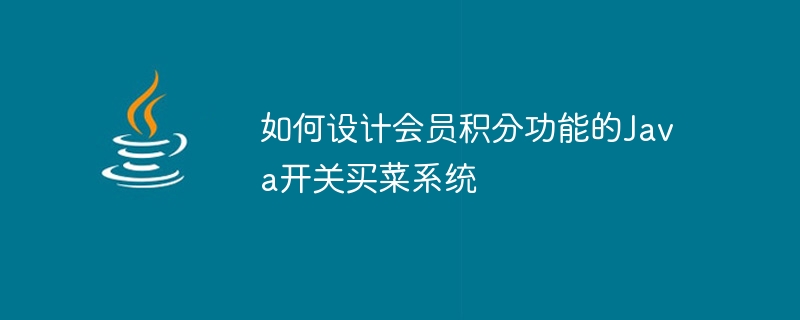Home >Java >javaTutorial >How to design a Java switch grocery shopping system with membership points function
How to design a Java switch grocery shopping system with membership points function
- 王林Original
- 2023-11-01 16:36:251449browse

As a common e-commerce model, the switch grocery shopping system is favored by more and more consumers. In order to improve user stickiness and attract more users to use the system, adding member points function has become an indispensable part. This article will introduce how to design the membership points function in the Java switch grocery shopping system to meet user needs.
- Determine the membership points rules
When designing the membership points function, you need to determine the points rules first. Points can be obtained through various behaviors such as user spending money and evaluating products. Different levels of membership are usually set up, and each level corresponds to a different points discount rate. Different membership levels and points rules need to be set in the system so that the system can automatically calculate and update points after the user triggers the rules.
- Design points service interface
During the development process, due to the complexity of the business logic, it is necessary to extract the points-related logic and design a points service interface separately. This interface needs to provide points addition, deduction, query and other operations to facilitate other modules to call. For example:
public interface PointService {
/**
* 增加积分
*
* @param userId 用户ID
* @param points 增加积分数
*/
void addPoints(Long userId, Integer points);
/**
* 扣减积分
*
* @param userId 用户ID
* @param points 扣减积分数
*/
void deductPoints(Long userId, Integer points);
/**
* 查询积分
*
* @param userId 用户ID
* @return 用户积分数
*/
Integer getPoints(Long userId);
}- Design integration rule implementation class
According to the determined integration rules, the corresponding implementation class needs to be written. The specific implementation process will vary according to different business scenarios. Here we take the full discount discount as an example. Assume that the points exchange ratio set by the system is 100:1. When points reach a certain number, they can be redeemed for coupons. When the amount of purchased goods meets certain conditions, coupons can be used to deduct the corresponding amount.
public class DiscountRuleServiceImpl implements PointRuleService {
/**
* 满减优惠规则:满足一定金额并使用优惠券可以抵扣指定金额
*
* @param userId 用户ID
* @param amount 购买商品金额
* @param points 使用积分数量
* @return 折扣金额
*/
@Override
public BigDecimal calculateDiscount(Long userId, BigDecimal amount, Integer points) {
if (points > 0) {
// 计算抵扣金额
BigDecimal discount = BigDecimal.valueOf(points).divide(BigDecimal.valueOf(100));
if (amount.compareTo(BigDecimal.valueOf(100)) > 0 && discount.compareTo(BigDecimal.valueOf(5)) >= 0) {
return BigDecimal.valueOf(5);
}
}
return BigDecimal.ZERO;
}
}- Combining points with orders
When users place orders, they need to consider the use of points. After the user chooses to use points to redeem, the corresponding points need to be deducted from the user's account. When the user has not redeemed points or has insufficient redeemed points, points cannot be used. At the same time, the points used by the user and the corresponding discount amount need to be recorded.
public class OrderServiceImpl implements OrderService {
// 积分服务
@Autowired
private PointService pointService;
/**
* 下单操作
*
* @param userId 用户ID
* @param goodsMap 商品及数量
* @param points 使用积分数量
* @return 订单信息
*/
@Override
public OrderInfoDTO placeOrder(Long userId, Map<Long, Integer> goodsMap, Integer points) {
BigDecimal totalAmount = BigDecimal.ZERO;
for (Map.Entry<Long, Integer> entry : goodsMap.entrySet()) {
// 根据商品ID查询商品信息
// 省略代码
totalAmount = totalAmount.add(goods.getPrice().multiply(BigDecimal.valueOf(entry.getValue())));
}
BigDecimal discount = BigDecimal.ZERO;
if (points > 0) {
// 使用积分兑换折扣金额
BigDecimal exchangeDiscount = pointService.exchangePoints(userId, points);
if (exchangeDiscount.compareTo(BigDecimal.ZERO) > 0) {
discount = exchangeDiscount;
}
}
if (totalAmount.subtract(discount).compareTo(BigDecimal.ZERO) <= 0) {
throw new RuntimeException("订单金额为0,不允许下单");
}
// 生成订单并保存
// 省略代码
// 记录积分使用情况
// 省略代码
return orderInfoDTO;
}
}- Point scheduled tasks
Since there will be a large number of users in the system who perform point operations during daily use, it is necessary to set up scheduled tasks to clean up useless points and avoid data Too much impact on performance. Scheduled tasks can regularly clean up expired points data, invalid data, etc. For example:
@Scheduled(initialDelay = 60000, fixedDelay = 3600000) // 每小时执行一次任务
public void cleanUpUselessPoints() {
// 清理过期积分数据
List<Long> expiredUserIds = pointRepository.findExpiredUserIds();
for (Long userId : expiredUserIds) {
pointService.deductPoints(userId, pointRepository.getTotalPoints(userId));
}
// 清理无效积分数据
List<String> pointIds = pointRepository.findUselessPointIds();
pointRepository.delete(pointIds);
}Through the design of the above steps, we successfully implemented the member points function in the Java switch grocery shopping system. The use of points can improve user experience, attract more users to use the system, and increase system activity. At the same time, reasonable points rules can also encourage users to consume and increase the commercial value of the system.
The above is the detailed content of How to design a Java switch grocery shopping system with membership points function. For more information, please follow other related articles on the PHP Chinese website!
Related articles
See more- Using PHP and Vue to develop a tier system for membership points after payment
- How to design a Java switch grocery shopping system with product recommendation function
- How to design a Java switch grocery shopping system with quick ordering function
- Food shopping system order table design guide in MySQL
- How to design a Java switch grocery shopping system with evaluation function

